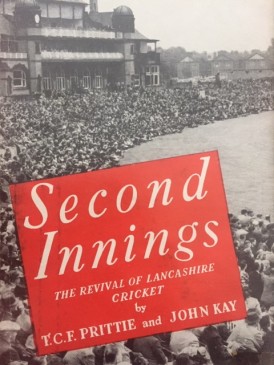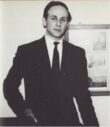Almost Forgotten Cricket Writers – Terence Prittie
Martin Chandler |
One of the first cricket books I ever bought, more than thirty years ago now, was Second Innings by Terence Prittie and John Kay. The book was published in Accrington by John Sherratt and Son in 1947, and was subtitled The Revival of Lancashire Cricket. The Red Rose had suffered more than most from the ravages of war, only four regulars from 1939 taking the field in 1946. No one expected much of the side that began that first post war season, but in the event Lancashire ended the summer in third place, just a whisker behind runners-up Middlesex, and Champions Yorkshire were only one more victory away from them. Middlesex had ten pre war regulars available, and Yorkshire could field an entire eleven of them.
Kay was the cricket correspondent of the Manchester Evening News for many years and his was a name I recognised, unlike that of his co-author. Second Innings was an enjoyable read for a Lancashire supporter, and in particular one who, at that point, had never had access to a 1947 Wisden. The book begins with a summary of Lancashire’s season before the bulk of it is taken up with a short report on each of the matches the county played in 1946, followed by brief pen portraits of the players. There is then a closing summary including a look at league cricket in the county. There are 151 pages in all, so Second Innings is not a mighty tome by any means.
In the same parcel that brought Second Innings to my door there was another book written by Prittie, this time on his own, Lancashire Hotpot. That one was published in 1948, by Hutchinson. With one exception the essays in the book were written in 1946. That exception was the final chapter, Looking Forward, that was clearly written after the close of the 1947 season, but before the visit of Bradman’s Invincibles in 1948.
In fact Lancashire Hotpot covers a good deal of the same ground as Second Innings with match reports on Lancashire matches and on the Tests against India. But there are a number of other essays, mainly pen portraits of some interesting cricketers. The book has a degree of enduring appeal because of those, covering as they do some less gifted players, but men who nonetheless make interesting stories. Examples are the Indian Gul Mahommed, one cap wonder Jack Martin of Kent and a couple of captains, David MacIndoe and Peter Cranmer, respectively of Oxford University and Warwickshire.
After those two purchases, inevitably enjoyed because of their content, I might never have given a thought to who Terence Prittie was. I did realise later that he had written a book about Middlesex as well, but it was several years before I picked up a copy of Mainly Middlesex, also published by Hutchinson, and in this case in 1946. It was only when I did eventually pick up a copy that I realised, for the first time, that Prittie was ‘Honourable’. There is then a short foreword from Plum Warner explaining that the book, essentially a collection of essays on Middlesex cricket and cricketers of the inter war years, had been written whilst Prittie was a prisoner of war.
The qualification for the title ‘Honourable’ came from the fact that Prittie’s paternal grandfather was the fourth Baron Dunally, and an Irish hereditary peer. In time Prittie’s father and later his older brother would succeed to the title. There was a strong military background and Prittie’s father spent more than twenty years as an officer in the Rifle Brigade before, badly wounded at Gallipoli. He was then invalided out of the Army with a pension.
Prittie was born in Ireland in 1913, but despite his background there was no silver spoon in his mouth. The family seat was an estate in County Tipperary, Kilboy, but its agricultural business consumed more in the way of resources than it ever generated. On eventually acquiring the Barony Prittie’s father could not make a success of it and in turn, despite a brave attempt, neither could Prittie’s brother when the title passed to him. The estate was sold in the 1950s.
Despite there not being too much money around Prittie was privately educated and in 1937 graduated from Oxford. He had a go at banking, and hated it, and then stockbroking, and was barely more enamoured of that. And then it was war, and Prittie took a commission in the Rifle Brigade.
The Rifle Brigade were despatched to France early in the war and, during the siege of Calais, just before the famous evacuation of the British Expeditionary Force from Dunkirk, Prittie was captured by the Germans. He was to remain in captivity for five years. In the early part of his incarceration he was involved in five unsuccessful escape attempts and was eventually moved to Colditz. It was the sixth time of asking when he was finally able to regain his liberty when, with the Germans and their prisoners in retreat, he took the opportunity to decamp.
On his return Prittie decided to try his hand at journalism, no doubt encouraged by the appearance in The Cricketer of an article he had managed to get past the German censors whilst incarcerated. He quickly got a job with the Manchester Guardian and for 1946, Neville Cardus at that time still in Australia, he stepped in to the shoes of the best known cricket correspondent of them all.
For 1947 Cardus was back, and there were to be no more cricket books from Prittie. By the time the vintage summer of 1947 had begun he had been sent to Germany as the Guardian’s Berlin correspondent, and he was to remain in Germany until 1970.
After leaving his position in Berlin Prittie wrote a number of books including a biography of the first West German Chancellor, Konrad Adenauer, and later a biography of one of Adenauer’s successors, Willy Brandt. There was also a book on German wine, but sadly none on cricket.
From 1970 Prittie’s job was a very different one. He was a conservative, which perhaps did not sit terrible easily with the Guardian’s gradual shift of ground towards the liberal left. He was not Jewish, but strongly believed in the right of the Jewish state of Israel to exist and his next job was, in his own words, to explain Israel’s case in the Middle East dispute, a task he continued right up to his death.
In 1975 `Prittie wrote an autobiography, Through Irish Eyes. Cricket plays a part, and there are some interesting passages on how, as a child, he was introduced to Warner at Lord’s. But there is no reference at all to cricket playing any part in Prittie’s life after the publication of Lancashire Hotpot – it must be possible that in Germany he just felt too far away from the game, but he must have remained a member of the Cricket Society as his name cropped up occasionally in their journal, although not as the writer of any substantial articles. Maybe there was something more to it, but whatever the reason for it the lack of any further cricket writing from Prittie is a matter of some regret, as those three titles that did appear in 1946 and 1948 are all excellent.






My Uncle, Terence Prittie, wrote an article entitled “Israeli Cricket” which was printed in the 1975 edition of Wisden. It is available on-line and describes a match in 1974 when he played in a match for Jerusalem against Petah Tikvah. He said that he had the opportunity to play because Jerusalem were short of a man!
Comment by Francis Prittie | 5:07pm BST 30 July 2019
I purchased a copy of Second Innings perhaps 20 years ago – or more. The book seemed to open a door on a different time. It is good to open the door on his interesting life.
Fraser Simm – author “Saltire and Flannels” and ” Echoes of a Summer Game” plus books on WW1 and the cashmere industry
Comment by Fraser Simm | 9:24pm BST 18 May 2022